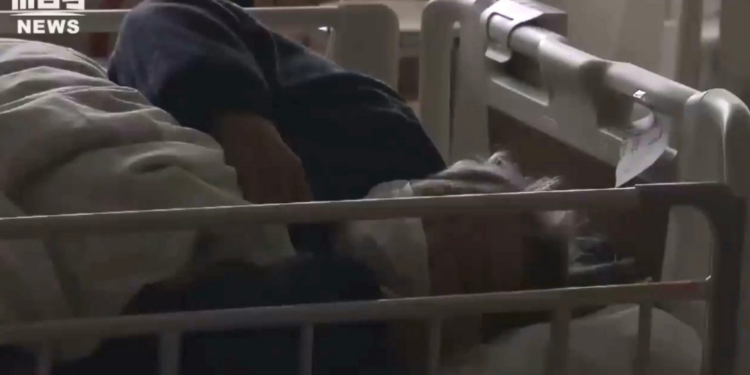Seeing the aftermath of the 7.5-magnitude earthquake that hit the Noto Peninsular in Ishikawa Prefecture on New Year’s Day, you may sympathise with the people in the refuge centres by thinking “How awful. Three years of Japan’s Covid nonsense and now this.” But you’d be wrong to assume Covid nonsense was over. On January 6th, a whopping three cases of Covid were reported at one of the refuge centres. And it’s not just Covid. There have been cases of influenza and norovirus too. So you know what that means.
As a 78-year-old women explained to a local, “For ventilation, the doors have been kept open, so it’s cold, but everyone is enduring it. We also wear masks while sleeping.”
Wearing masks while sleeping is so stupid I’m surprised the Japanese Government never officially recommended it. But its health effects are positively invigorating compared with those of keeping doors open in midwinter, especially in a refuge centre full of underfed and highly stressed elderly.
You may think that when the idea was proposed, someone would surely have pointed out the self-defeating absurdity of making people cold in order to stop them catching colds. But this behaviour actually exemplifies Japan’s zero-risk attitude to Covid perfectly.
You see, Covid is a risk, so each so-called ‘infection prevention measure’ such as sleep-masking and ventilation from freezing cold wind is assumed to bring the risk closer to zero. Thus, the more measures, the better. So everyone endures it, as the old lady says. And if the measures lead to someone dying from hypothermia (or three years of extensive socioeconomic damage), then korona dakara sho ga nai (‘because of Covid, it can’t be helped’).
And with a national mentality like this, the people can’t be helped much either.
This article first appeared on Guy Gin’s Substack page, Making (Covid) Waves in Japan. Subscribe here.













To join in with the discussion please make a donation to The Daily Sceptic.
Profanity and abuse will be removed and may lead to a permanent ban.
People who come up with schemes like that should be swabbed until death by nose-bleeding. This is nothing but wanton cruelty inflicted on a vulnerable group of people whose crime is that they have no means of escaping it.
Excellent
Didn’t they have hospitals that practiced this kind of treatment? They were abandoned in the 1970s because they realised it didn’t work, sanatoriums I believe they were called!
Mixed news from the England branch of world folly and evil – Mrs ToF went for a blood test today, no masks in sight. On the other hand an acquaintance has a daughter with a bad cough that has lasted weeks, antibiotics no good, amid the otherwise pretty good service she was getting from the GP it was suggested she should make her take a “covid test” – likely result that she will then dutifully “isolate” if she tests positive, instead of getting on with life. At least the mum hasn’t bothered testing her up to now.
Well what I find hilarious is that for a site that’s all about ‘free speech’, there’s a hell of a lot of censorship. Not only has resident Gestapo agent, ‘Hardliner’, locked me out of the site so I can’t log in on my phone, but he’s removed part of my post in the Round-up section. Ever feel like you’re being surveilled? You probably are…Actually it’s obviously just me that’s on a special ‘list’.
”Profanity and abuse will be removed…” except anything Hardliner doesn’t like is removed. Profanity and abuse do not factor in to it. Repeatedly, and without explanation, evidently. Care to comment, Hardliner? No, course not. I’m calling you out on your behaviour so you could at least do the decent thing, but I shan’t be holding my breath….But this post will self-destruct in 5, 4, 3, 2….
I’ve been annoyed by this as well. OTOH, this is the website of the people who run it and they decide what gets published there. That’s just the way it works.
It’s Hardlines on a power trip, that’s what it is. Being deliberately antagonising. Either that or they’re Muslim and I’m pissing them off with my anti-Islam posts, channeling my inner Geert Wilders!




But it’s the double standards with the whole “free speech” gig. What is the criteria used by which some mod deems a post *inappropriate* and worth fiddling with? Especially as none of the posts he/she’s removing of mine breach the above warning.
So given that the “profanity and abuse will be removed…” warning is just mere window dressing, and posts are getting edited/removed anyway, with not even a courteous explanation provided, then from this day forth I’m identifying as a Tourettes sufferer, because fuck it. It makes no difference.
Now bring on the swear jar!
Some years ago, Karl Lauterbach (German Mr COVID and health minister) did a photo-op with some pre-teen girls about to go to a Dangerous climate change! march he was also planning to attend and he referred to them in a very weird (according to my personal judgement) way, something like “These young girls just told me why they’re worried about climate change and now, we’ll go to a climate march together!” I mentionend that once in a comment and the sentence got deleted. No idea why.
All my relatives keep doing that, too, and they all dutifully isolate when positive. But at least, they’ve discarded the masks (I personally threw one my mother was still carrying “just in case” into the bin). I keep telling them that COVID is essentially a cold and that it will usually pass on its own quickly enough that people will rarely even consciously notice this and hope that it’ll eventually sink in.
Japan has really lost its mojo.
I know someone who nearly died of pneumonia because our great NHS ambulance service did exactly the same thing to him.